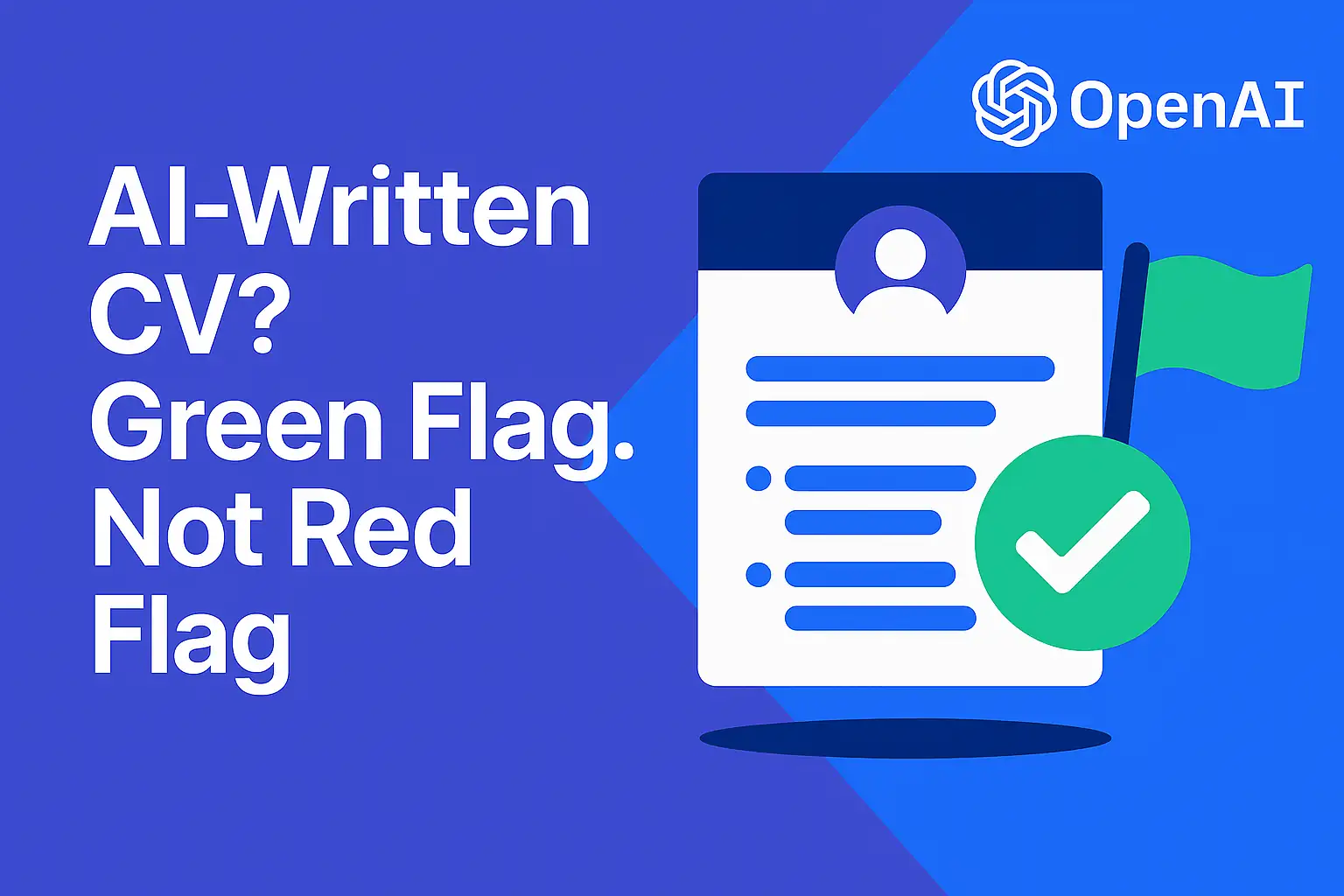
Recruiters Can Detect AI CVs — And That’s Why You Should Use AI in Yours
- Why AI on your CV isn’t a problem
- From typewriters to AI — the evolution of job applications
- Benefits of using AI for your CV
- How recruiters already use AI in hiring
- Tips to use AI wisely when writing your CV
- The real risks: when AI backfires
- Why embracing AI future-proofs your career
Why AI on your CV isn’t a problem
Let’s challenge the assumption: why should using AI for your CV be considered “cheating”? It’s no different than using spellcheck, formatting templates, or online portfolio builders. These are all tools that streamline work and improve clarity. AI just happens to be the next, more powerful tool in the chain.
Recruiters who recognize AI-crafted CVs aren’t seeing a lack of authenticity. They’re seeing proof that you’re not afraid to experiment, adopt new tools, and apply them practically. For modern employers, this is a signal of adaptability — one of the most in-demand skills in today’s market.
From typewriters to AI — the evolution of job applications
History repeats itself. Every wave of new technology has faced resistance before becoming the standard:
- The computer replaced the typewriter — and suddenly CVs could be formatted faster, easier, and with fewer mistakes.
- Email replaced physical letters — recruiters once frowned upon “impersonal” emails, until they became the global norm.
- Online databases replaced encyclopedias — research became faster, democratized, and far more comprehensive.
Today, AI is replacing outdated manual writing. Just like we no longer expect handwritten resumes, we will no longer expect applicants to spend endless hours rewording bullet points when an AI tool can help structure them clearly.
Calling AI “cheating” is like saying Word replaced handwriting unfairly. It’s simply progress.
Benefits of using AI for your CV
Here are some very real reasons why leveraging AI when writing your CV is a strength, not a weakness:
- Efficiency: AI reduces hours of writing into minutes, letting you focus on tailoring content instead of formatting.
- Clarity: Tools help eliminate jargon, improve readability, and emphasize measurable results.
- Consistency: AI ensures your CV maintains a professional tone across sections without contradictions.
- ATS optimization: Recruiters often use Applicant Tracking Systems (ATS). AI helps you structure content with the right keywords to pass those filters.
- Confidence boost: Job seekers often doubt their phrasing or achievements. AI provides a starting point that reduces stress.
Instead of hiding AI usage, candidates should be proud to show they know how to harness it effectively.
How recruiters already use AI in hiring
Here’s the irony: AI is often the first recruiter to review your CV. Large companies use AI-powered systems to filter candidates before a human even glances at an application. These tools scan for keywords, structure, and even formatting.
This means two things:
- If you understand AI, you know how to write for both machines and humans.
- If you refuse AI, you risk falling behind — because the very systems deciding your fate are powered by it.
In fact, AI in recruitment is only expanding: from chatbots answering candidate questions, to predictive analytics identifying high-potential applicants. Showing AI fluency on your CV positions you as aligned with how the hiring process already works.
Tips to use AI wisely when writing your CV
Using AI doesn’t mean letting it fully control the narrative. It means combining its speed with your personal authenticity. Here’s how:
- Provide strong input: Feed AI clear achievements, metrics, and experiences. Garbage in = garbage out.
- Customize the draft: Never use the first output as is. Add your voice, personality, and unique context.
- Adapt per role: Use AI to tailor bullet points to the job description. Recruiters love CVs that match their specific needs.
- Check tone: Ensure the AI output reflects your style — confident, but not exaggerated.
- Proofread manually: AI sometimes introduces errors or awkward phrasing. Always do a final human check.
Think of AI as your editor and assistant, not your ghostwriter. The best results come when human and AI collaborate.
The real risks: when AI backfires
That said, there are some risks to be mindful of. Recruiters aren’t against AI; they’re against badly used AI. For example:
- Generic content: Copy-pasted AI text without personalization feels bland and uninspired.
- Over-inflated claims: AI may exaggerate achievements, which recruiters quickly notice.
- Obvious style mismatches: If your cover letter sounds robotic but your interview doesn’t, it raises doubts.
The solution is simple: treat AI as a support tool, not a replacement. Just as spellcheck doesn’t make you a great writer, AI alone won’t land you a job. Your input still matters most.
Why embracing AI future-proofs your career
Think of it this way: ignoring AI is like refusing to use ATMs when banks went digital. You might survive for a while, but you’ll slowly exclude yourself from the modern world. Companies are actively seeking talent who can integrate AI into workflows, because that’s where efficiency and innovation come from.
By showing you understand AI on your CV, you signal to employers that you’re ready for the future of work. And let’s be honest: AI won’t stop at CVs. It’s already powering project management, marketing campaigns, software development, and customer support. Knowing how to use AI strategically makes you more than just a job applicant — it makes you a future-proof asset.
So the next time someone says “recruiters can see your CV is written with AI,” don’t panic. Smile. Because what they’re really seeing is this: you’re one step ahead.